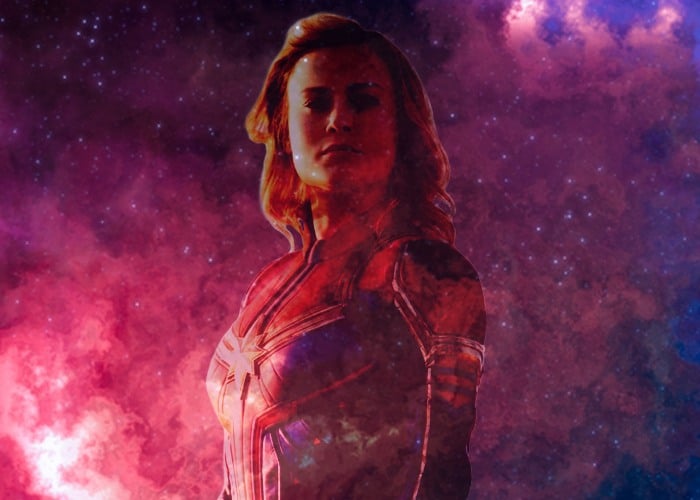For all of the outcry and celebration spurred by having a woman lead a Marvel film, Captain Marvel‘s most powerful feminist moments are rarely positioned as such. The classic origin story is framed as a struggle between Carol Danvers’ (Brie Larson) dual Kree and human identity, as the two sides must be well-balanced in order to coexist. Her Kree half gives her powers, but her human identity — which she is unaware of at the film’s start — manifests itself as a tendency towards emotion and impulsivity. These are two traits that her mentor Yon Rogg (Jude Law) tells her she must learn how to turn off, a winking reference to a criticism oft-heard by women everywhere. This narrative is made more compelling when we look at it from a feminist perspective.
The circumstances under which Carol becomes a Kree warrior are not ones she chooses. After destroying Dr. Wendy Lawson’s (Annette Benning) energy core, the ensuing explosion knocks Carol out and her body absorbs its radiation, effectively wiping all of her memories and giving her Kree energy. But the most critical moment of the scene is Yon Rogg’s decision to take her body back to Hala; instead of leaving her on Earth, he intends to use her as a member of his Starforce. Just like that, her body is stolen from her loved ones and herself, and she must spend the next few years trying to regain autonomy that she hadn’t even known she’d lost.
Captain Marvel seems to avoid a trap that many other superhero films fall into, by refusing to sexualize its hero’s body. In fact, there’s no indication that she’s a sexual being at all unless her relationship with fellow US Air Force pilot Maria Rambeau (Lashana Lynch) is read into heavily. While all of this is a welcome change, it also gives the filmmakers an opportunity to explore how women’s bodies can be manipulated outside of an overtly sexual context.
As it turns out, Carol’s body is no longer hers in more ways than one, because the symbols of her Kree identity are a dual representation of everything she’s lost since being taken away to Hala. The blue blood that runs through her veins is not her own, but a transfusion from Yon Rogg; the chip implanted behind her ear is revealed to suppress the full range of her powers; and the uniform she wears is a symbol of the ruthless army she was captured by and then worked for. She’ll never have red blood again, but when she rips away the chip and changes the uniform, she is able to take part of herself back from her captors.
These physical restraints are reinforced by Yon Rogg’s constant manipulation, which Carol is subjected to for many years. He grooms her into believing that her physical weaknesses are the consequence of excessive emotion: “Master yourself,” he tells her. “Don’t let your emotions override your judgments.” His taunts are often phrased as challenges: “Can you keep your emotions in check?” This kind of language is heavily coded by gender, though the film prefers to play Carol’s emotional side as part of being human. She’s referred to throughout the film as a “weapon” and a “tool,” indicating that no matter what, she is reduced to an object that lacks humanity.
As such, Carol is merely the means to an end: Yon Rogg is using her powers for his own advantage but discourages her from the kind of “impulsivity” that would put him and the Starforce in danger. He was right to be afraid because her empathy is what helps her connect with the Skrulls and draws her closer to the truths of her past. These emotions are a signal of Carol’s humanity, and they help her reconnect to her original identity; but for many, they’re also reminders of her femininity, and how stereotypically female characteristics are often played off as weaknesses.
It’s true that Captain Marvel has plenty of moments that serve to make specific points about the way that women are treated in a man’s world: Young Carol is teased for not being strong enough by her male peers. Back on Earth after her crash, she’s told to smile by a random motorcyclist. After she defeats the Starforce, Yon Rogg comically tries to make it seem like he let Carol win. But while these small one-liners may resonate as quotable bright spots, it’s the overarching message of Carol reclaiming her body and emotional strengths that gives the film’s climax an empowering punch.

